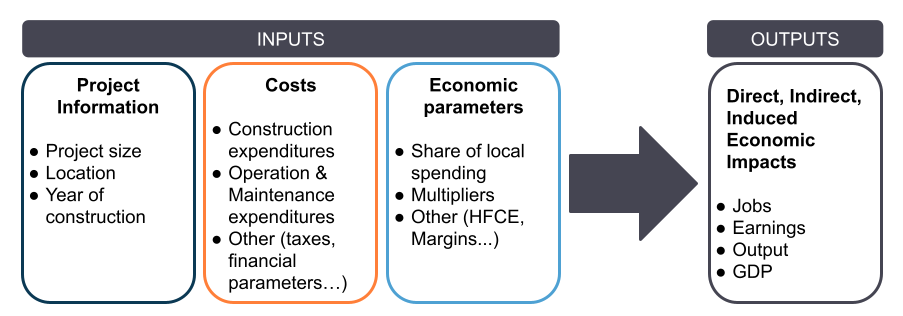The Economic Impacts of Electrification Initiatives (EI2) models are user-friendly tools that allow to easily analyze jobs and economic impacts from electrification-related projects. The results are an estimate.
The Economic Impacts of Electrification Initiatives (EI2) models are designed to assess employment and other economic impacts of electrification initiatives such as building and operating power plants or electrifying energy services, in Canadian provinces and territories. Industry specific economic data are used to estimate local economic activity and the resulting impacts.

There are 3 categories of inputs:
- Project information (e.g.: plant capacity, 150 MW)
- Costs and other associated parameters (e.g.: CAPEX or OPEX).
- Economic parameters (e.g.: share of local spending)
Outputs:
- The impact for employment represents the number of local jobs supported by the earnings (in terms of full-time equivalent for a year).
- The Earnings are the wages and salaries paid to the workers.
- The Output is the overall level of economic activity.
- The GDP is the approximate contribution of this project to the domestic economy
Types of impacts:
- Direct impacts are related to project development and on-site labor.
- Indirect impacts are related to the supply chain.
- Induced impacts are related to the workers spending
EI2 models can be used by provincial and territorial decision-makers, public utility commissions, potential project owners, developers, and others interested in analyzing the economic impacts associated with new or existing power plants, energy services or other projects.
About
The EI2 models were adapted from the JEDI models by Éloïse Edom, research associate at the Institut de l’énergie Trottier, as part of the NRCAN-supported Energy Modelling Initiative. The objective is to provide the various actors of the energy sector with a simple and flexible decision support tool adapted to the context of the Canadian provinces and territories.
For more information about the EI2 models contact: or
The JEDI models are developed by the National Renewable Energy Laboratory (NREL). For more information, please visit: https://www.nrel.gov/analysis/jedi/.
Thanks
We would like to thank all our collaborators from:
- CERI
- ESMIA Consultant
- NRCAN
- NREL
- STATCAN
- York University, social exergy + energy lab



